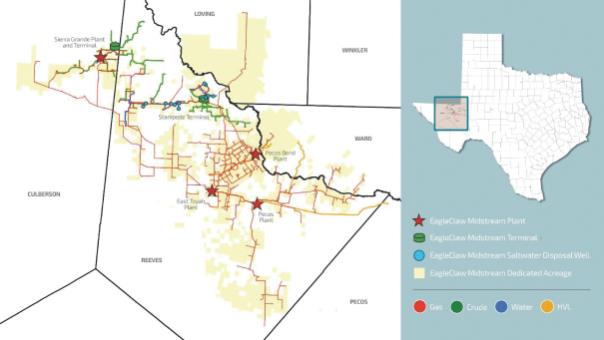Customer Agreements with Apache
Apache is an independent energy company that explores for, develops, and produces natural gas, crude oil, and NGLs. Apache has been one of the Company’s most significant customers since it commenced operations. The Company provides gas gathering, compression, processing, transmission, and NGL transmission services pursuant to acreage dedications provided by Apache, comprising the entire Alpine High resource play and surrounding areas. Revenues under these contracts are 100 percent fee-based, resulting in no direct commodity price exposure attributable to the contracts.
In addition, Apache agreed that any gas produced from Apache-operated wells located within the dedication area that is owned by other working interest owners and royalty owners is dedicated to the Company, so long as Apache has the right to market such gas. The agreements are effective for primary terms ending March 31, 2032. The primary term will automatically extend for two five-year periods unless Apache provides at least nine months’ prior written notice of its election not to extend the primary term. The covenants under the agreements are intended to run with the land and will be binding on any transferee of the interests within the dedicated area.
During 2020, we entered into separate agreements to provide compressor maintenance, operations and related services to Apache for a fixed monthly fee per compressor services.
Environmental, Social and Governance Considerations
Overview
We strongly value ethics, responsibility and integrity. Our environmental policies are designed to ensure that our employees, officers and directors conduct business with the highest standards of integrity and in compliance with all applicable laws and regulations. In June of 2021, we published our inaugural Environmental, Social and Governance Report (the “Report”). The Report focused on four key areas: Governance, Environmental, Health and Safety, and Community Engagement.
Governance
We utilize a robust internal structure to implement ESG policy, including (i) the Board of Directors for governance and oversight; (ii) the president and CEO to monitor implementation; (iii) an Executive Steering Committee for strategic development; and (iv) an ESG Working Committee to handle implementation and coordinate all ESG initiatives with the Company.
We see ESG as a critical component of how the Company and in 2021, we started tying bonuses to ESG goals. In 2022, we will be tying 20% of all salaried employees’ (including executives) at-risk pay to the achievement of specific ESG goals.
We restructured our Environmental, Health, and Safety function to reflect our 2020 focus of building a robust health and safety program. Reporting directly to the Chief Operating Officer, the newly created Vice President of Environmental, Health and Safety expanded his team to increase expertise and compliance with regulatory obligations. The team now includes a Director of Health and Safety, a Director of Environmental compliance and a Director of Pipeline Integrity Management.
We have developed an enterprise risk management program across all functional areas to identify mechanisms for prioritization and mitigation. The program features areas including emergency events, risks associated with climate change, human capital, company reputation, information technology and cybersecurity. We have defined tools, teams and processes to mitigate and manage these topics, implementing a robust, plan-based business strategy that aims to identify, assess, and prepare for any dangers, hazards, and other potentials for disaster—both physical and figurative—that may interfere with the organization’s operations and objectives.
As an organization with significant infrastructure, cybersecurity is of great importance. The Company adheres to external cybersecurity standards such as the National Institute of Standards and Technology and ISO frameworks along with Sarbanes-Oxley controls in our accounting system. We have multi-factor authentication for all users, a 180-day password change policy, separation of duties in accounting systems, controlled access to network drives based on department groups, endpoint protection, mobile device management, and device encryption.
